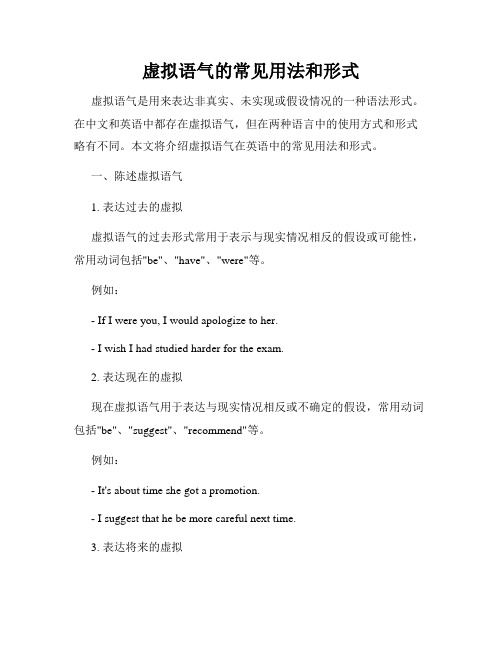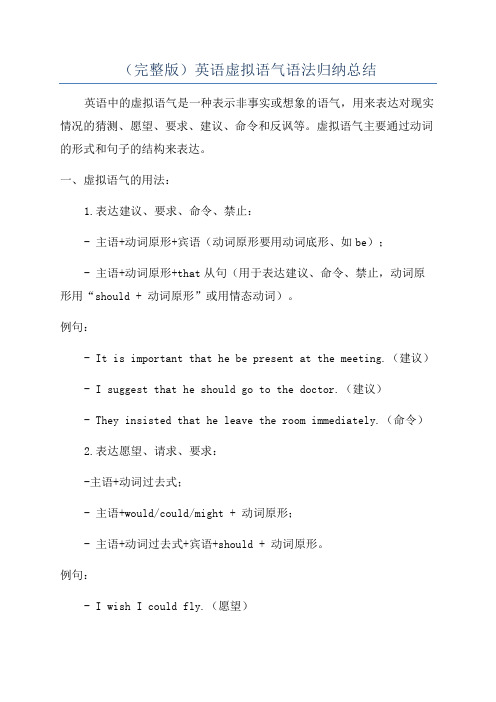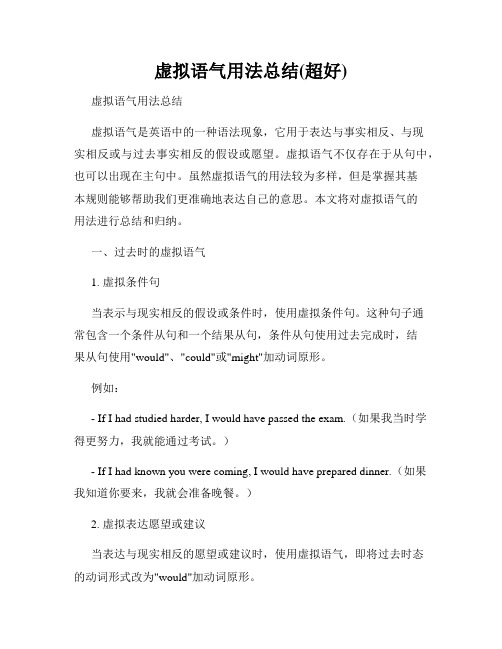虚拟语气用法精讲(简单、易懂)
虚拟语气的常见用法和形式

虚拟语气的常见用法和形式虚拟语气是用来表达非真实、未实现或假设情况的一种语法形式。
在中文和英语中都存在虚拟语气,但在两种语言中的使用方式和形式略有不同。
本文将介绍虚拟语气在英语中的常见用法和形式。
一、陈述虚拟语气1. 表达过去的虚拟虚拟语气的过去形式常用于表示与现实情况相反的假设或可能性,常用动词包括"be"、"have"、"were"等。
例如:- If I were you, I would apologize to her.- I wish I had studied harder for the exam.2. 表达现在的虚拟现在虚拟语气用于表达与现实情况相反或不确定的假设,常用动词包括"be"、"suggest"、"recommend"等。
例如:- It's about time she got a promotion.- I suggest that he be more careful next time.3. 表达将来的虚拟将来虚拟语气用于表达与现实情况相反或不可能实现的假设,常用动词包括"should"、"were to"等。
例如:- If I should win the lottery, I would buy a big house.- If it were to rain, the event would be canceled.二、命令虚拟语气当表示一种命令、建议或要求时,常使用虚拟语气来显得客气或委婉。
例如:- I suggest that you arrive on time for the meeting.- It's important that he be there for the ceremony.三、愿望虚拟语气愿望虚拟语气用于表达对过去、现在或将来的愿望、期望或希望。
(完整版)英语虚拟语气语法归纳总结

(完整版)英语虚拟语气语法归纳总结英语中的虚拟语气是一种表示非事实或想象的语气,用来表达对现实情况的猜测、愿望、要求、建议、命令和反讽等。
虚拟语气主要通过动词的形式和句子的结构来表达。
一、虚拟语气的用法:1.表达建议、要求、命令、禁止:- 主语+动词原形+宾语(动词原形要用动词底形、如be);- 主语+动词原形+that从句(用于表达建议、命令、禁止,动词原形用“should + 动词原形”或用情态动词)。
例句:- It is important that he be present at the meeting.(建议)- I suggest that he should go to the doctor.(建议)- They insisted that he leave the room immediately.(命令)2.表达愿望、请求、要求:-主语+动词过去式;- 主语+would/could/might + 动词原形;- 主语+动词过去式+宾语+should + 动词原形。
例句:- I wish I could fly.(愿望)- I would appreciate it if you could help me.(请求)3.表示虚拟条件:- If条件从句中的谓语动词用过去完成时,主句用would/should/might/could + have + 过去分词;- If条件从句中的谓语动词用过去时,主句用would/should/could + 动词原形。
例句:- If I had known his phone number, I would have called him.(虚拟条件)- If you had listened to me, we could have finished the project earlier.(虚拟条件)4.表达建议、要求、祝愿:- If only内部称述 + 主语 + 过去式。
虚拟语气的用法归纳

虚拟语气是一种特殊的动词形式,用来表达说话人的假设、愿望、猜测、建议等非现实的情况。
虚拟语气在英语中的使用非常广泛,包括情态动词、动词的过去式、过去完成时、be 型虚拟式等形式。
下面我将详细介绍虚拟语气的用法。
一、情态动词的虚拟语气1. 表示现在或将来的假设例如:If I had money, I would travel around the world.2. 表示过去的假设例如:If I had studied harder, I would have passed the exam.3. 表示与现在事实相反的愿望例如:I wish I were rich.4. 表示与过去事实相反的愿望例如:I wish I had studied harder.5. 表示与将来事实可能相反的愿望例如:I wish it would stop raining.二、动词的过去式的虚拟语气1. 表示现在或将来的假设例如:If I knew the answer, I would tell you.2. 表示过去的假设例如:If I had seen the movie, I would have recommended it to you.三、过去完成时的虚拟语气1. 表示过去的假设例如:If I had had more time, I would have finished the work.2. 表示与过去事实相反的愿望例如:I wish I had gone to the party last night.四、be型虚拟式1. 表示现在或将来的假设例如:If I were you, I would take the job.2. 表示与现在事实相反的愿望例如:I wish I were in Hawaii now.五、混合虚拟语气1. 表示过去的假设例如:If I had known that you were coming, I would have met you at the airport.2. 表示与过去事实相反的愿望例如:I wish I had studied harder and passed the exam.六、虚拟语气的特殊用法1. 在某些形容词后面使用虚拟语气例如:It is important that you be on time.2. 在某些名词后面使用虚拟语气例如:It is necessary that he study harder.3. 在某些介词后面使用虚拟语气例如:I am glad that you came.以上是虚拟语气的用法归纳,希望对大家有所帮助。
虚拟语气用法总结(超好)

虚拟语气用法总结(超好)虚拟语气用法总结虚拟语气是英语中的一种语法现象,它用于表达与事实相反、与现实相反或与过去事实相反的假设或愿望。
虚拟语气不仅存在于从句中,也可以出现在主句中。
虽然虚拟语气的用法较为多样,但是掌握其基本规则能够帮助我们更准确地表达自己的意思。
本文将对虚拟语气的用法进行总结和归纳。
一、过去时的虚拟语气1. 虚拟条件句当表示与现实相反的假设或条件时,使用虚拟条件句。
这种句子通常包含一个条件从句和一个结果从句,条件从句使用过去完成时,结果从句使用"would"、"could"或"might"加动词原形。
例如:- If I had studied harder, I would have passed the exam.(如果我当时学得更努力,我就能通过考试。
)- If I had known you were coming, I would have prepared dinner.(如果我知道你要来,我就会准备晚餐。
)2. 虚拟表达愿望或建议当表达与现实相反的愿望或建议时,使用虚拟语气,即将过去时态的动词形式改为"would"加动词原形。
例如:- I wish I were taller.(我希望我更高。
)- She suggested that he take a bus.(她建议他坐公交车。
)二、现在时的虚拟语气1. 虚拟条件句与过去时的虚拟条件句类似,现在时的虚拟条件句也包含一个条件从句和一个结果从句。
条件从句使用"were to"结构或"should"加动词原形,结果从句使用"would"、"could"或"might"加动词原形。
例如:- If I were to win the lottery, I would travel the world.(如果我中了彩票,我会周游世界。
高中英语虚拟语气的用法归纳

高中英语虚拟语气的用法归纳以下是高中英语虚拟语气的用法归纳:虚拟语气是一种特殊的动词形式,表示假设、愿望、建议、命令、猜测等非真实的情况。
一、基本用法1. 与现在事实相反条件从句:If + 主语 + 动词过去式(be 动词用 were)主句:主语 + would/should/could/might + 动词原形例句:If I were you, I would study harder. (如果我是你,我会更努力学习。
)Wouldn't life be boring if we had everything we wanted? (如果我们想要什么就有什么,生活岂不是很无聊?)2. 与过去事实相反条件从句:If + 主语 + had + 过去分词主句:主语 + would/should/could/might + have + 过去分词例句:If I had known your phone number, I would have called you. (如果我知道你的电话号码,我就给你打电话了。
)Couldn't you have done better if you had tried harder? (如果你再努力些,难道不能做得更好吗?)3. 与将来事实相反条件从句:① If + 主语 + 动词过去式② If + 主语 + were to + 动词原形③ If + 主语 + should + 动词原形主句:主语 + would/should/could/might + 动词原形例句:If it rained tomorrow, we would stay at home. (如果明天下雨,我们就待在家里。
)If she were to come here tomorrow, I would be very happy. (如果她明天来这儿,我会非常高兴。
)If he should fail in the exam, how disappointed his parents would be!(要是他考试不及格,他父母该多失望啊!)二、固定搭配1. wish 后的宾语从句与现在事实相反:从句用一般过去时与过去事实相反:从句用过去完成时与将来事实相反:从句用 would/could + 动词原形例句:I wish I were as tall as you. (我希望我和你一样高。
虚拟语气的用法归纳

虚拟语气的用法归纳虚拟语气是英语中一种特殊的句式,它用来表达与事实相反或与实际情况有差别的意思。
它可以帮助我们表达不同形式的否定、虚拟假设、条件、建议、建议等。
本文将对虚拟语气的用法进行归纳,以便更好地理解它。
一、虚拟语气的基本概念虚拟语气是一种特殊的句式,它表示“如果”的意思,即“假如”,“要是”,“如果”,“就好了”,“就像”,“就算”等。
它可以表达不同形式的否定、虚拟假设、条件、建议、建议等。
二、虚拟语气的使用1. 否定形式:如果不,要是不,就算不,就好了不,就像不。
例句:If he didn't come, I wouldn't be here now.2. 条件形式:如果,要是,就算,就好了,就像。
例句:If it rains tomorrow, we'll have to cancel the picnic.3. 虚拟假设形式:如果,要是,就算,就好了,就像。
例句:If I had a million dollars, I'd travel around the world.4. 建议形式:如果,要是,就算,就好了,就像。
例句:If I were you, I would take this opportunity.三、虚拟语气的动词形式1. 一般时态:Should/would/could/might(动词原形)例句:I should go to bed early if I want to wake up early.2. 过去时态:should/would/could/might + have + 动词过去分词例句:I should have gone to bed earlier if I wanted to wake up early.3. 将来时态:should/would/could/might + be going to + 动词原形例句:I should be going to bed early if I want to wake up early.四、虚拟语气的重要点1. 虚拟语气使用在if引导的句子中,即虚拟条件句。
虚拟语气的用法总结
虚拟语气的用法总结虚拟语气是一种语法现象,常常用于表达非真实情况、假设情况、愿望意愿等。
在英语中,虚拟语气有两种形式:过去虚拟语气和现在虚拟语气。
下面是对虚拟语气的用法进行总结。
一、过去虚拟语气的用法:1. 表达不可能实现的愿望、欲望或建议:If only + 主语 + 过去完成时(had + 过去分词)例句:If only I had studied harder, I would have passed the exam.(要是我当初努力学习的话,我就能通过考试了。
)2. 表示对过去发生的事情的假设:If + 主语 + had + 过去分词, 主语 + would/could/might + 动词原形例句:If I had taken the bus, I would have arrived on time.(要是我坐公共汽车的话,我本能准时到达。
)3. 表示对与现在事实相反的情况的假设:If + 主语 + 过去式, 主语 + would/could/might + 动词原形例句:If I were you, I would apologize to her.(要是我是你的话,我会向她道歉。
)4. 表达对不可能实现的条件:If only + 过去式例句:If only I had a million dollars.(要是我有一百万美元该多好。
)二、现在虚拟语气的用法:1. 表达建议、命令等正式用法:表达建议:(should +动词原形/动词原形)例句:It's important (that) you should take some rest.(你应该休息一下,这很重要。
)表达命令:(应用“命令式”的虚拟形式)例句:It's vital (that) he be here on time.(他必须准时到达,这很重要。
)2. 表达愿望、要求、建议等陈述式的用法:It's time/It's high time + 过去式例句:It's time you went to bed.(你该去睡觉了,时间到了。
虚拟语气精讲精练总结
What would you do if you won the lottery? If I won the lottery, I would…
If I won the lottery, I would buy an expensive car.
If I had a lot of money,
1. if only 意为:若是...那该多好啊; 真希望...; 只要, 只要...就好 表示现在的情况,应用过去式; 如果是过去的情况,应用过去完成时态
If only I had arrived in time !
If only she didn’t drive so fast.
I wish I ________ you yesterday.
His silence at the meeting suggested that he ________ to your plan.
A.didn’t agree B.hadn’t agreed
C.wouldn’t agree D.not agree
NOTES:
与现在相反
例: If I were a teacher, I would be strict with my students.
If I had HIV, I would know because I would feel sick.
had HIV
would feel
were
would be
had driven
If he more carefully, he the car accident yesterday.
would not have had
If I how to swim, I trapped in this island. had learnt would not have been
虚拟语气的用法及常见情况
虚拟语气的用法及常见情况虚拟语气是指用来表达与事实相反、与现实情况不符或表示假设、愿望、建议等的语气。
虚拟语气在表达中起到了丰富语言的作用,常见于口语和书面语中。
本文将介绍虚拟语气的基本用法,并探讨一些常见的应用情况。
一、虚拟语气的基本用法1. 假设:虚拟语气用于表示与事实相反或与现实情况不符的假设。
例如:如果我是你,我会尽快解决这个问题。
假如明天下雨,我们就不去郊游了。
2. 建议:虚拟语气可用来表示建议、命令等。
例如:我们建议你尽快处理这个事情。
他们要求我们赶快离开。
3. 愿望:虚拟语气可用来表示愿望、要求等。
例如:我希望你能够理解我的困境。
要是我有更多的时间,我就可以做更多的事情了。
4. 批评:虚拟语气还可用于表示批评、责备等的语气。
例如:要是你更加努力,你就能考上大学。
如果你不再犯同样的错误,你就能取得更好的成绩。
二、虚拟语气的常见情况1. 虚拟条件句虚拟条件句用于表示假设条件和其结果之间的关系。
常用的虚拟条件句包括:- 类型I:表示真实的可能性。
例如:如果我有时间,我会帮你的。
- 类型II:表示与现实相反的假设。
例如:要是我是富人,我就可以环游世界。
- 类型III:表示与过去事实相反的假设。
例如:如果我早知道他的真面目,我就不会与他合作了。
2. 虚拟语气与情感动词情感动词后常跟虚拟语气,用于表示愿望、要求、命令等。
常见的情感动词包括:- 希望: 希望你能够顺利通过考试。
- 要求: 公司要求员工每天按时上班。
- 命令: 她命令他立即离开房间。
3. 虚拟语气与时间状语从句时间状语从句中的虚拟语气用于表示与事实相反的情况。
常见的时间状语从句包括:- 情况非常好的时候,假设早些来是多么好啊。
- 要是我当时不迟到,我就能见到他。
4. 虚拟语气与形容词从句形容词从句中的虚拟语气用于表示与事实相反的情况。
常见的形容词从句包括:- 如果他是个有耐心的人,他就能够完成这个任务。
- 假如她是个勤劳的人,她就能取得更多的成就。
虚拟语气的类型和用法
虚拟语气的类型和用法虚拟语气是一种语法现象,用来表示与事实相反、不可能实现、假设、愿望、命令等意义。
虚拟语气在英语中使用广泛,掌握其类型和正确用法对于提高语言表达能力至关重要。
本文将介绍虚拟语气的类型和用法,帮助读者更好地理解和运用虚拟语气。
一、类型1. 虚拟条件句虚拟条件句常用来表示与事实相反的假设情况。
它由“if”引导,主句中谓语动词用过去将来时(动词原形前加“should”)。
例如:If I were a bird, I would fly freely in the sky.如果我是一只鸟,我将在天空自由地飞翔。
2. 虚拟假设句虚拟假设句用来表示与事实相反或不可能实现的条件。
它可以使用“were to” + 动词原形,或用“had + 过去分词”。
例如:If I were to win the lottery, I would travel around the world.如果我中了彩票,我将环游世界。
If I had studied harder, I would have passed the exam.如果我学得更用功,我就能通过考试了。
3. 虚拟愿望句虚拟愿望句表示对现在或将来的愿望,多用“would like to”或“wish”引导。
例如:I wish I were taller.我希望我长得更高。
I would like to live in a big city.我想住在一个大城市。
4. 虚拟命令句虚拟命令句用来表示对过去或将来的命令、要求或建议,常用词语有“should”、“would rather”等。
例如:I suggested that he should try his best.我建议他尽力而为。
The teacher insisted that the students would rather be quiet in class.老师坚持学生们应该在课堂上保持安静。
- 1、下载文档前请自行甄别文档内容的完整性,平台不提供额外的编辑、内容补充、找答案等附加服务。
- 2、"仅部分预览"的文档,不可在线预览部分如存在完整性等问题,可反馈申请退款(可完整预览的文档不适用该条件!)。
- 3、如文档侵犯您的权益,请联系客服反馈,我们会尽快为您处理(人工客服工作时间:9:00-18:30)。
B. has broken
C. were broken D. had been broken
2.It is (high / about) time (that) sb did/ sb should(不可省略) + do
该是某人做某事的时候了。
It is high time that you got up/should get up.
He looks as if he were an artist. He talked about the accident as if he had seen it. (区分even if/though)
注意:若表示的确有某种可能(尤指天气), 也可不用虚拟语气。
Eg. Look! The clouds are gathering.It looks as if it’s going to rain . When a pencil is partly in a glass of water, it looks as if it ______. A. breaks
B.have not succeeded
C.did not succeed
D.had not succeeded
He hesitated for a moment before kicking the ball, otherwise he _____ a goal.
A.had scored B.scored C.would score D.would have scored
I’m getting tired; it’s time we _____ home.
A. go C. went B. are going D. should be going
3.wish/if only(要是……就好了)+从句
与现在事实相反 did/were 与过去事实相反 had done(或用could have done) 与将来事实相反 could/would/might + do
— Why didn’t you buy it?
— I ______ but I didn’t have the money.
A. would
B. would have
C. had had D. had bought
二、虚拟语气的其他用法
1.as if / as though(好像)+从句
与现在相反 与过去相反 与将来相反 did/were had done would/could/might+ do
1.I was ill that day. Otherwise, I would have taken part in the sports meeting.
=If I hadn‘t been ill that day, I would have taken part in the sports meeting.
与将来事实相 主语+ 反的假设 1.did
2.should do 3.were to do
主语+should / would/ could / might + do
1.如果我是你,我会接受他的建议。
If I were you, I would accept his advice. 2.如果明天下雨,我会待在家里。 If it rained/should rain/were to rain tomorrow, I would stay at home.
5.用于表示 建议(advise/ suggest/ propose/recommend) 命令(order/ command) 要求(demand/require/ request/ desire) 坚持要求(insist) 等词相连的从句中需用虚拟语气: sb (should)+ do 1.I suggested that he (should) go there at once. (宾语从句)
Without electricity, human being life ______ quite different today. A.is
B.will be
C.would have been
D.would be
But for his help, I ______.
A.should not have succeeded
2.He telephoned to inform me of your birthday, or I would have known nothing about it. 3.I should have given you more help, but I was too busy. 4.What would you do with a million dollars? 5.Without / But for your help, we couldn’t have finished the work ahead of time. =If it had not been for your help, …
would /could /might visit
4.在would rather+宾语从句中
与现在或将来事实相反 与过去事实相反 did/were had done
即:would rather sb did/ had done
came I would rather you ______(come) here tomorrow. hadn’t told I would rather you __________ (not tell)me the truth.
D.would not have been polluted
2. if从句中,were,had(完成时态标志),should可 以放在句首,(用于倒装结构),if必须省略。否定词 not不能放在前面。 1.Had I not seen him then(Hadn’t I seen him then), I wouldn't have been very happy.
3.如果你以前好好学习, 你会通过考试的。 If you had studied hard before, you would have passed the exam.
You didn’t lurn, you ______ so tired.
If we had taken such effective measures much earlier, the river _____ so seriously now. A.is not polluted B.would not be polluted C.had not been polluted
I wish (that)he________________(visit) us tomorrow. visited I wish (that) he_________(visit)us today. had visited us/ could have visited us I wish he____________________________(visit) us yesterday. had listened If only you _____________ (listen)to our advice! were (be)a bird! If only I _____
4.If you had studied hard before, you would have passed the exam. Had you studied hard before,……
3、含蓄虚拟语气 有时为了表达的需要,在虚拟语气中,并不总 是出现if引导的条件句,而通过其它手段来代替 条件句。 常用的有介词with,without,but for(倘没有, 要不是);连词or,but;副词otherwise等。
一、虚拟语气在 if非真实条件句中
虚拟条件从句(If)
与现在事实相 反的假设
主语+did/were
主 句
主语+should / would/
could / might + do
与过去事实相 反的假设
主语+ had done
主语+ should / would/ could / might +
have done
2.My advice is that we (should) tell him the news.
3.I made a suggestion that he------(同位语从句)
4.It is suggested that he------(主语从句) 5.My suggestion was that he-----(表语从句)
B. touched
C. be touched
D. touch
注意: suggest:表明,暗示 陈述语气 建议 虚拟语气 was (be)ill and that Her pale face suggested that she _____ (should) be sent she ________________(send) to hospital immediately.
区别:
This is the suggestion that/ which he made at the meeting.(定语从句)
The officer gave the order that nothing ____ until the people arrived. A. didn’t touch
A.drove; didn’t get
B.drove; wouldn’t get
C.were driving; wouldn’t get
